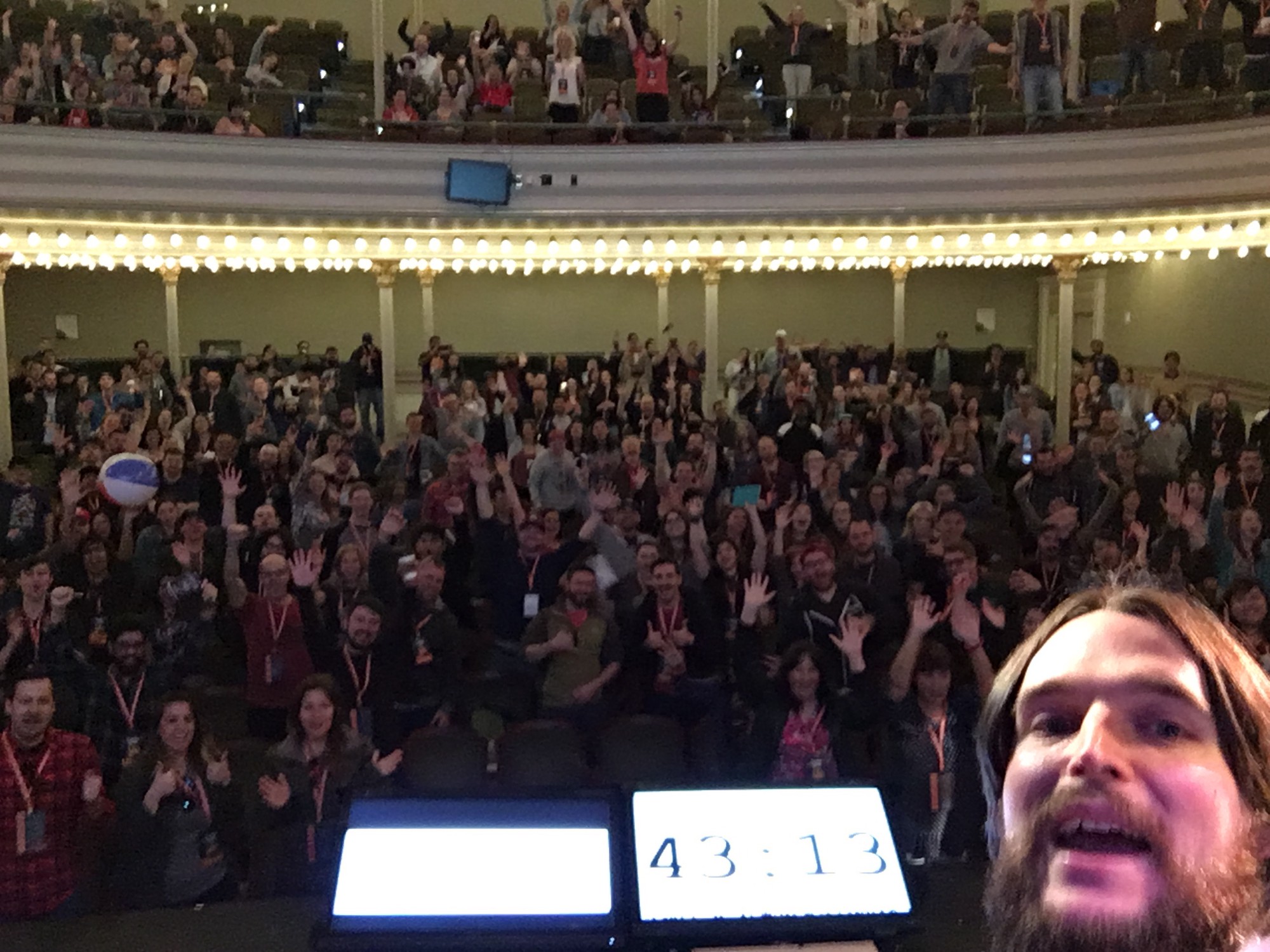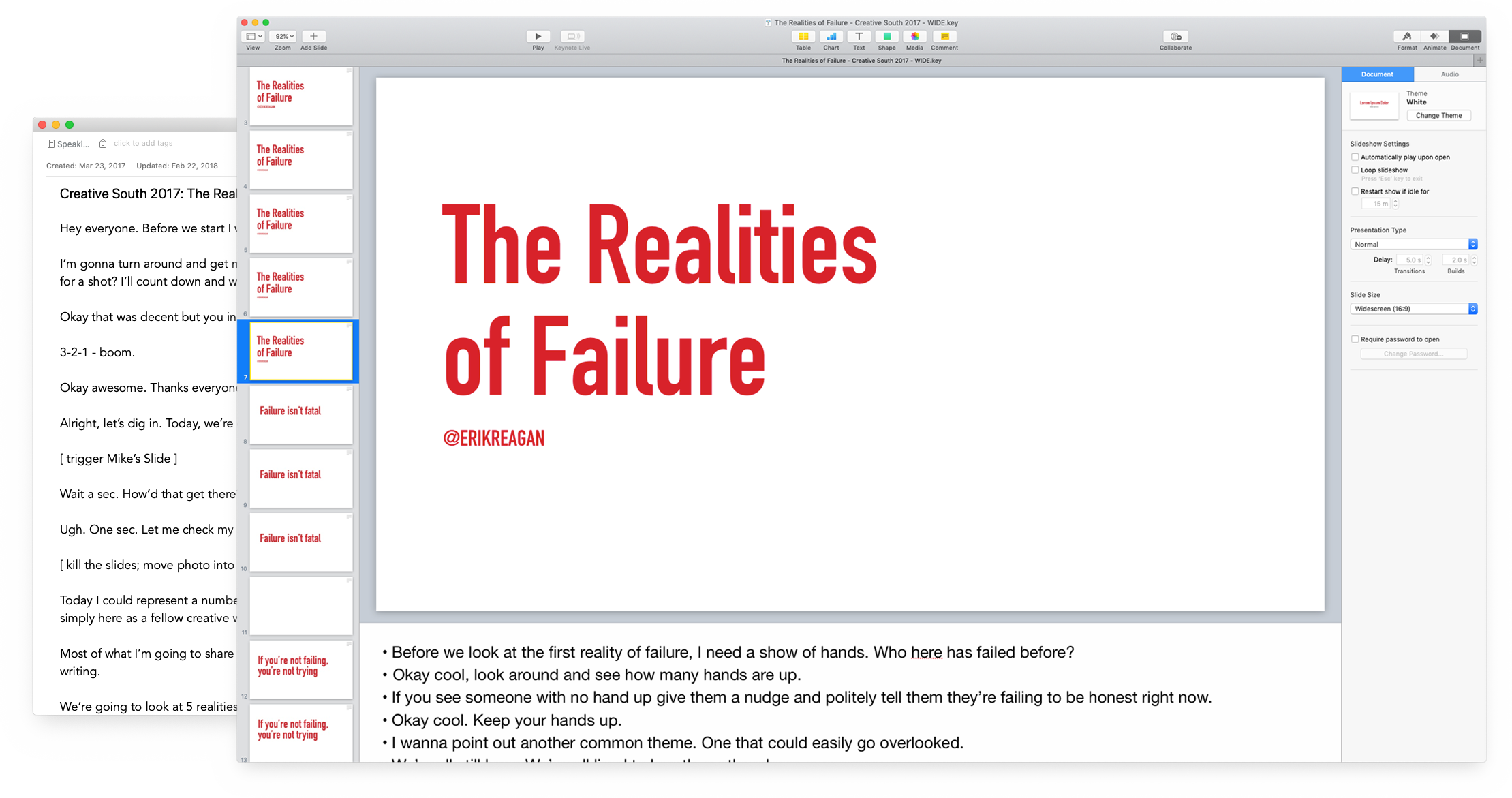Just over a week ago I spoke at Creative South where hundreds of creatives from across the globe gather each year. I commanded the stage like a seasoned pro, shared a poignant story of failure, taught from the heart, and confidently walked off stage knowing I had nailed it.
When it comes to public speaking, I’m a natural. It’s as simple as that.
Okay, so that’s mostly bull.
I’m definitely not a natural public speaker. (Whatever that is.) And I definitely didn’t walk off stage thinking I had nailed it. But it turns out that this was the perception of some. In fact, some of the opening paragraph above came from some comments from one person in the audience at Creative South.
After talking to a few folks I realized it might be helpful — to at least a few people — if I pulled back the curtain a bit on my personal experiences of public speaking. Plus, one of my company’s Core Standards is to Keep it Real and I want to honor that here as best I can.
Truth and courage aren’t always comfortable, but they’re never weakness.
Brené Brown
With that, I’ll get straight into my confessions. This should be fun.
At least, it feels like my body hates me when I do any speaking.
Around 3 – 4 weeks prior to a speaking engagement, my stomach is in knots any time I think about actually being on the stage. It gets worse as the date gets closer. And the topic I speak on seems to have an effect on the intensity of the feelings.
As an example, I spent many years writing code and building websites. Many of the talks I’ve given have been technical in nature. Preparing for a technical talk and preparing for a non-technical talk are different experiences for me. The more vulnerable I’m going to get on stage, the harder my body reacts.
The worst came one year ago when I spoke at an event called Peers (which is a fantastic event, I might add). My talk was the most transparent one I’d given at the time. I felt a weight on my heart to share openly and encourage others in a way I hadn’t before.
The night before was terrible.
I tried to go to sleep fairly early to be well rested. But my stomach was a wreck, I couldn’t slow down my brain, and sleep was nowhere to be found.
I’ve now given variations on that talk a few more times. Each time is slightly easier than the last. But my body still hates me and reminds me before I get on stage.
Ironically, one of the topics in my talk last week was Imposter Syndrome. (It’s that voice in your head that says you don’t know what you’re doing — despite your prior success or experience.) But being able to talk about it from a stage doesn’t make me immune to it. I’ve thought to myself many times, “Who are you to even be up there? Have you seen the lineup of other speakers? Did you hear that one talk from yesterday? You’re out of your league, dude.”
That’s the inner voice that I have to shut down each time I speak.
Each. Time.

I have a full time job and it’s not public speaking. I try hard to prepare well in advance of my time on stage. I owe that to the audience, the organizers, the other speakers, etc. But even with the preparation I do I make multiple mistakes each time I’m on stage.
Each time I walk off stage I almost immediately go into a list of things I forgot to do, didn’t mean to do, or can’t remember if I did right.
Using Creative South as an example, within about 90 seconds of being off stage I noted the following:
And this is the third time I’ve given this talk! You should have seen the list from the first time I gave it.
I always strive to get better at the things I do. Public speaking is no exception. So walking off stage with these types of thoughts is no big deal to me—at this point. I write them down and commit to making the next talk even better.
This one is simple. I can’t seem to memorize a 30 – 45 minute talk. And I’m fine with that right now. Each talk I’ve given in the past has been very intentionally written. So if I don’t have notes to remind me of what’s next I just miss stuff. You can see that in the list from Confession 3 above.

I recognize that this is not a new idea. Nor is it unique to public speaking. But I’m mentioning it here mostly so other speakers, mainly those who are still new to the stage, can understand how normal it is to be critical of one’s self.
In Confession 3 I talked about the things that run through my head when I walk off stage. If you’re not careful, those can be destructive thoughts instead of constructive ones. I’m often my own worst critic with my talks because I’m often the only person who knew everything I meant the talk to be. But I can’t let that take away from what the audience actually got out of it.
One of the most rewarding things about speaking is speaking with audience members afterward. The opportunity to hear how my stories and lessons learned have impacted someone else is one I cherish. I’m honored to have a chance to be used in such a way. And this is just the medicine I need sometimes when I’m being my own worst critic.
But this is probably enough for now.
My main goal in writing this was to encourage anyone early in their public speaking journey. I tend to keep a lot of my thoughts internal and within a small group of close friends. While I’ve shared everything above before, none of it was in a public forum where anyone could get a glimpse. Even my own business partner thought speaking like this was a pretty chill thing for me these days. (Nope!) Hopefully this helps other new speakers know they aren’t alone if they share in some of my confessions.
After a dozen or so speaking engagements I’ve learned plenty of lessons I can share with people just getting started. But I’ve got far more to learn. And I plan to do just that. Keep learning.
After all, one day I might just be a natural public speaker.
© 2024 Erik Reagan unless otherwise noted
Some of the links on my site are "affiliate links." This means if you click on the link and purchase the item, I will receive an affiliate commission. It's basically peanuts, but every little bit will help as I work on self-publishing my first book.